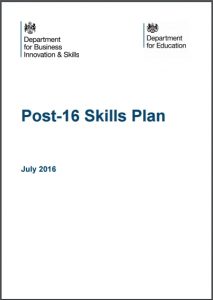Mark Farmer’s review of the UK construction labour model for the UK’s Construction Leadership Council, starkly titled Modernise or Die (PDF available here), has been published today (read news release). It has been widely reported in both trade press and national newspapers, and somewhat cautiously welcomed by the CLC’s co-chair Andrew Wolstenholme.
We have been awaiting this report for some months, as previous blog posts attest (here and here, for example), and our patience has been rewarded. Farmer’s hard-hitting report prominently highlights the SkillsPlanner opportunity, with an entire page (p.34) devoted to a case study about the project.
Time for action
According to Farmer, Britain’s construction industry faces “inexorable decline” unless radical steps are taken to address its longstanding problems, which include its dysfunctional training model, its lack of innovation and collaboration as well as its non-existent research and development (R&D) culture. He also said the industry needs to be far more joined-up with its clients in how it approaches skills.
With more people leaving the industry each year than joining, the construction workforce is shrinking, placing increasingly severe constraints on its capacity to build housing and infrastructure. Reliance on a fractured supply chain and self-employment also means there is little incentive for contractors to invest in long term training for the labour force. Farmer says:
“… carrying on as we are is simply not an option. With digital technology advancements pushing ahead in almost every other industry and with the construction labour pool coming under serious pressure, the time has come for action.”
Break down the ‘data silos’
His review includes several case studies, each showing how to improve different dimensions of the industry’s performance. SkillsPlanner is particularly highlighted in a section titled “Lack of Collaboration & Improvement Culture”:
“Lack of collaboration and joined up thinking also means the ability to use ‘open linked / big data’ principles to guide the industry on current and future skills requirements have not been maximised. The increasing importance of data means that such approaches would better enable the business case for investment in training and new ways of delivering by better aligning investment to a demand pipeline. … The culture of ‘data silos’ within the industry needs to be broken as part of the wider societal democratisation of data.”
(This was something touched upon in the government’s response to the Sainsbury review in its Post-16 Skills Plan in July 2016 – post.)
Encouragingly, the Farmer Review (p.31) also mentions two sister projects addressing the skills gap through brokerage: BuildForce, and the former Crossrail brokerage which has now been transferred to an Ethos-managed initiative called Build London.




 Each work-stream is being led by a relevant organisation that will submit recommendations to the Taskforce by the end of the year, and the Chartered Institute of Building (CIOB, author of a 2015 report on the
Each work-stream is being led by a relevant organisation that will submit recommendations to the Taskforce by the end of the year, and the Chartered Institute of Building (CIOB, author of a 2015 report on the  Mr Hawkes said that the CIOB will analyse the responses it receives and then host ‘inquiry-style discussions’ before submitting its recommendations to the National Housing Taskforce by the end of the year. The final National Housing Taskforce report, incorporating recommendations from all 12 workstreams, is expected to be released by spring 2017.
Mr Hawkes said that the CIOB will analyse the responses it receives and then host ‘inquiry-style discussions’ before submitting its recommendations to the National Housing Taskforce by the end of the year. The final National Housing Taskforce report, incorporating recommendations from all 12 workstreams, is expected to be released by spring 2017.



